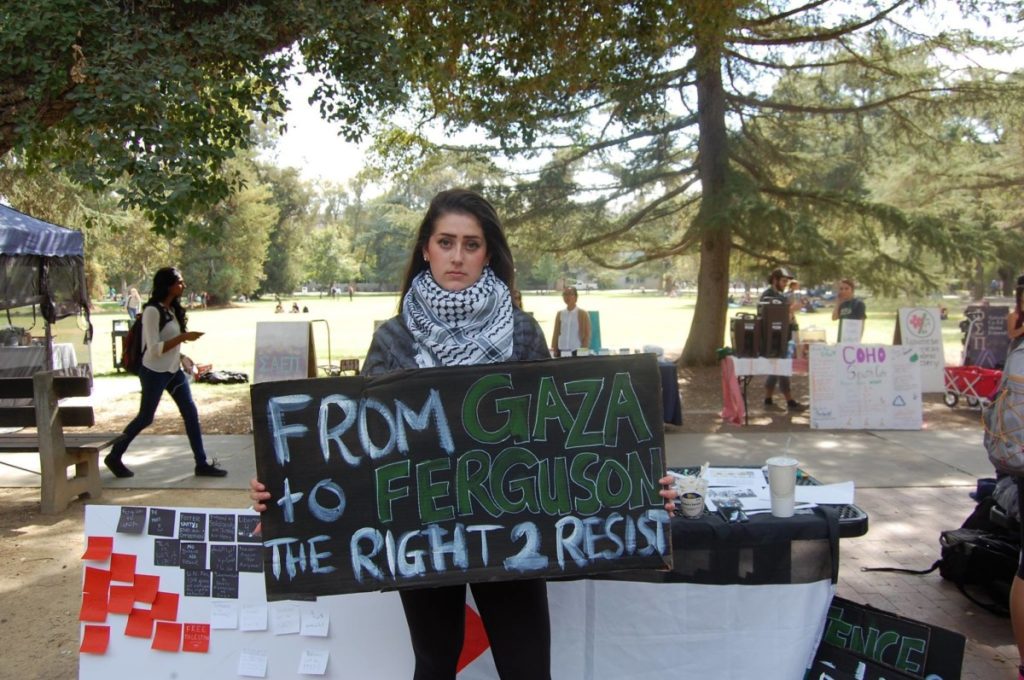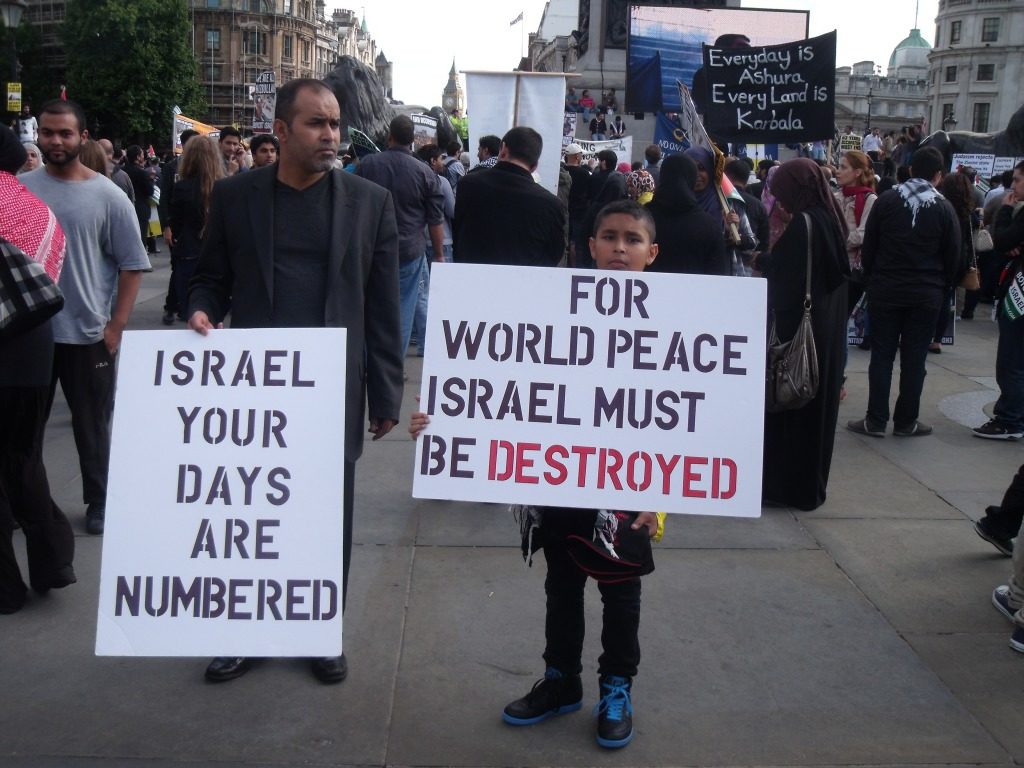SJP appropriates minority struggles to further its anti-Israel agenda
Students for Justice in Palestine (SJP) speaks highly of its efforts to “highlight intersectional themes and struggles,” and attract “diverse and unified student activist populations” across campuses nationwide.
When it comes to student recruitment, SJP chapters across the country openly appeal to Latino struggles. But does SJP really stand with the Hispanic community? Do they have any burden of proof behind their claims? The short answer is no.
Over the course of the SJP’s 25-year history, their track record points to two major interests: the defamation of the State of Israel and its people, and spreading SJP’s heinous ideologies.
SJP chapters promote slogans like “Two Walls, One Struggle,” “SJP stands with DACA students,” and “From Gaza to Mexico” — but these are nothing more than disingenuous appeals to the Latino community based on lies, false equivocations, and appropriated narratives.

For example, in 2014, SJP and a Latino student organization at Arizona State University hosted a series of events equating the issue of US-Latin American immigration with Palestinian experiences in Gaza and the West Bank. On the surface, the message appeared commendable — poverty, crime, and infrastructure are common in regions across the world, with Latin America and the Middle East being no exception.
The problem is who SJP and the Latino students on this campus sought to unjustifiably blame: the State of Israel.
Nowhere did this campaign mention the clearest perpetrators of Palestinian oppression, corruption, and human rights abuses — Hamas in the Gaza Strip, and the Palestinian Authority in the West Bank. Nor did they mention the wide array of dictatorships and corrupt governments in Latin America that have forced people to leave their communities and make the treacherous journey north.
How is it possible for Students for Justice in Palestine to claim that they care for these communities while encouraging campaigns with such blatant omissions and intellectual dishonesty?
Let us consider SJP’s primary call to action for minority college students: to advocate in favor of the Boycott, Divestment, and Sanctions (BDS) campaign against Israel.
Supporters of BDS call for a discriminatory economic boycott against the State of Israel and her citizens. That’s right, SJP’s primary call to action fails to address Palestinians at all, despite evidence that BDS is likely to threaten the livelihood of Palestinians more than any other group. Case in point: supporters of BDS continue to campaign for the closure of more than 775 Israeli-operated businesses in the West Bank that employ more than 11,000 Palestinians. Furthermore, these businesses offer their Palestinian workers two to three times the standard wage in the Palestinian territories, safer working conditions, and other protections under the most stringent labor rights laws in the Middle East.
SJP’s primary call to action fails to address Palestinians at all…
Last summer, I had the privilege to visit the West Bank and document the experiences of workers at some of these factories. Instead of SJP and BDS descriptions of oppression and “apartheid,” all the sites I visited revealed an atmosphere of joyful and passionate employees. I saw Palestinians and Israelis, Jews, Muslims, and Christians working side-by-side.
What would it mean for Palestinians if these businesses closed? In 2015, BDS reached a milestone — their first major victory. After much harassment, the Israeli startup SodaStream closed its West Bank plant in Mishor Adumim, leading to the layoff of more than 1,300 workers, almost half of whom were Palestinian, and over two-thirds of whom were Arab.

By encouraging Latinos to support the BDS movement, Students for Justice in Palestine reveal their ignorance about the integral role that our community undertook in the development of labor laws, unions, and workers’ rights. Cesar Chavez rightfully used boycotts and unionization to advocate for the very thing that these Israeli-Palestinian economic collaborations offer: a just and dignified recognition of Palestinian humanity, the enforcement of stringent labor policies, and a work environment where people are treated justly. Instead, SJP desires to use the same innovations that are a part of our legacy to do the opposite for Palestinians.
Another disreputable tactic exhibited by SJP chapters is a lack of tolerance for Latino communities that have an ethnic and cultural connection to Israel, namely the Jewish communities of Latin America.
SJP members can be seen chanting “death to Israel”, disseminating antisemitic propaganda, and using maps reflecting the merging of the Jewish state with a single Palestinian state. The results of this hateful rhetoric include the harassment and bullying of Latino Jewish students, disrupting Jewish cultural events, and creating a campus culture that promotes antisemitism.
The Hispanic community must be aware of the importance of Israel to Latino Jews — and while we may all have our political differences, it is inexcusable to attempt to delegitimize the indigenous roots of the Jewish people. There is no room for SJP’s hateful rhetoric in our community.

In the spring of 2018, UCLA’s SJP chapter members harassed fellow students hosting an Indigenous People Unite event with shouting, chanting, and the destruction of personal property. In true SJP fashion, a leader of the chapter tore an Armenian flag from the hands of an event organizer calling it “his (expletive) flag” implying that minority students are not allowed to have views that do not align with his.
SJP’s push for intersectionality only goes as far as necessary to spread their hateful ideology and falsely depict the State of Israel as apartheid and racist, even at the expense of minorities and Palestinians.
Contributed by Fuller Theological Seminary CAMERA Fellow Douglas Sandoval. Originally published at the Algemeiner.

